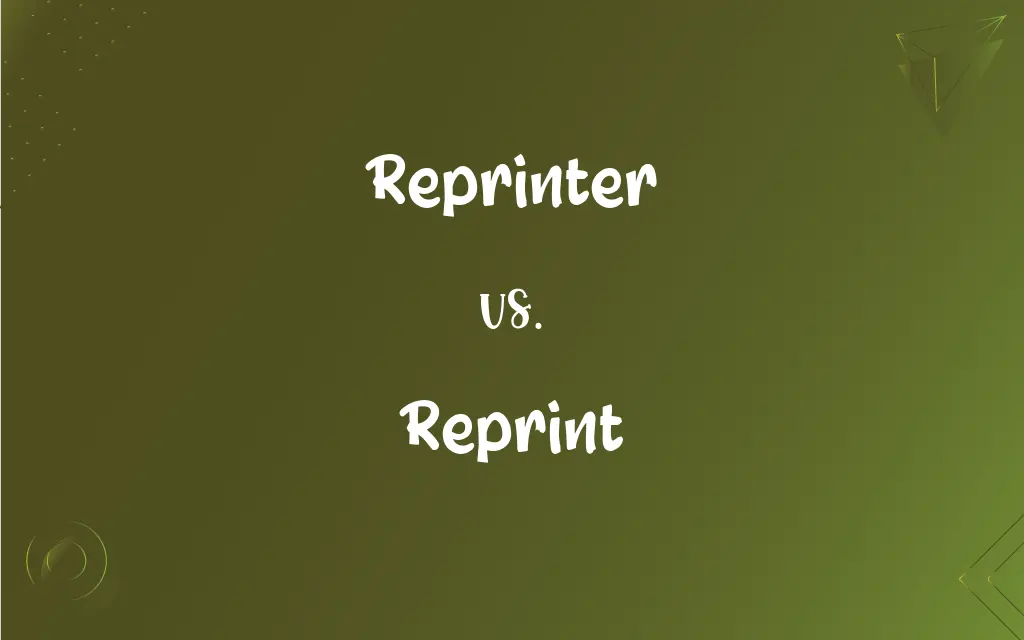Reprinter vs. Reprint: What's the Difference?
By Harlon Moss || Updated on May 23, 2024
A "reprinter" is a person or entity that produces new editions of printed works, while a "reprint" refers to the actual new edition or reproduction of the original printed material.

Key Differences
A reprinter is an individual or company that specializes in producing new copies of existing printed works. They take the responsibility of making old, rare, or out-of-print books available again by creating new editions. On the other hand, a reprint is the result of the reprinter's work. It is the actual new edition or reproduction of the original printed material. Reprints can be identical to the original in terms of content and format, or they may include additional elements such as new introductions, updated covers, or revised content.
Reprinters play a significant role in the publishing industry, often working with original publishers or authors to ensure the accuracy and quality of the reprinted material. Whereas reprints serve the purpose of making previously published works available again, often to meet continued demand or to preserve historical and academic works.
Reprinters must adhere to copyright laws and secure the necessary permissions to produce reprints, ensuring that the intellectual property rights of authors and original publishers are respected. In contrast, the focus for a reprint is on the content and its accessibility, often bridging the gap between past publications and current readers.
The process of reprinting can involve various formats, including digital versions, paperbacks, and hardcovers, depending on the target audience and market demand. While the role of a reprinter is more about the production and legal aspects, reprints are the tangible products that readers purchase and consume.
Comparison Chart
Definition
A person or entity that produces new editions of printed works.
The new edition or reproduction of the original printed material.
ADVERTISEMENT
Role
Produces and distributes new editions of existing works.
Represents the actual product, the new edition or copy.
Focus
Ensuring quality, accuracy, and legal compliance in production.
Making the content available and accessible to readers.
Involvement
Works with authors, publishers, and distributors.
Purchased and read by consumers and researchers.
Legal Aspect
Must secure permissions and adhere to copyright laws.
Must contain original or legally allowed content.
Reprinter and Reprint Definitions
Reprinter
An entity involved in the reproduction of out-of-print materials.
As a reprinter, they focus on academic texts that are no longer available.
ADVERTISEMENT
Reprint
A copy of an out-of-print work.
She found a reprint of the rare cookbook online.
Reprinter
A publisher that republishes works under license.
The reprinter negotiated with the original publisher to reprint the novel.
Reprint
An edition produced to meet continued demand.
The novel's popularity led to multiple reprints.
Reprinter
A person who prints new copies of existing works.
The reprinter specializes in bringing rare books back into circulation.
Reprint
A newly printed version of an old book.
This reprint features a new foreword by the author.
Reprinter
A company that produces reprints of books.
The reprinter has an extensive catalog of reprinted classics.
Reprint
A new edition of a previously published work.
The book is available as a reprint from the 1970s edition.
Reprinter
A new printing that is identical to an original; a reimpression.
Reprint
A new printing that is identical to an original; a reimpression.
Reprinter
A separately printed excerpt; an offprint.
Reprint
A separately printed excerpt; an offprint.
Reprinter
A facsimile of a postage stamp printed after the original issue of the stamp has been discontinued.
Reprint
A facsimile of a postage stamp printed after the original issue of the stamp has been discontinued.
Reprinter
To make a new copy or edition of; print again.
Reprint
To make a new copy or edition of; print again.
Reprinter
One who reprints.
Reprint
A book, pamphlet or other printed matter that has been published once before but is now being released again.
The reprint is much less expensive than a first edition.
Reprinter
One who reprints.
Reprint
(transitive) To print (something) that has been published in print before.
The novel was printed with an appendix.
Reprinter
Someone responsible for ensuring the quality of reprinted editions.
The reprinter reviewed the old manuscripts before reprinting.
Reprint
(transitive) To renew the impression of.
Reprint
To print again; to print a second or a new edition of.
Reprint
To renew the impression of.
The whole business of our redemption is . . . to reprint God's image upon the soul.
Reprint
A second or a new impression or edition of any printed work; specifically, the publication in one country of a work previously published in another.
Reprint
A publication (such as a book) that is reprinted without changes or editing and offered again for sale
Reprint
A separately printed article that originally appeared in a larger publication
Reprint
Print anew;
They never reprinted the famous treatise
Reprint
A reproduction of the original printed material.
The reprint includes all the original illustrations.
FAQs
Why are reprints important?
Reprints make rare, out-of-print, or highly demanded works accessible to a broader audience.
What does a reprint mean?
A reprint is the actual new edition or reproduction of the original printed material.
How does a reprinter differ from a publisher?
A reprinter specifically focuses on reproducing existing works, while a publisher may produce both new and existing works.
Are reprints identical to the originals?
Reprints can be identical or may include additional elements such as new forewords or updated designs.
Can reprints become collectibles?
Yes, certain reprints can become valuable collectibles, especially if they are of rare or significant works.
What is a reprinter?
A reprinter is a person or company that produces new editions of previously published works.
What is the main role of a reprinter?
The main role of a reprinter is to produce and distribute new editions of existing works.
What legal considerations do reprinters face?
Reprinters must secure permissions and adhere to copyright laws before producing new editions.
Who benefits from reprints?
Libraries, researchers, collectors, and general readers benefit from reprints.
Why might a book be reprinted?
Books may be reprinted due to high demand, historical significance, or to preserve the original content.
How do reprints affect the publishing industry?
Reprints help sustain the availability of important works and contribute to the preservation of literature.
How do reprinters ensure quality?
Reprinters review original materials, work with experts, and use high-quality printing techniques.
What distinguishes a reprint from an original edition?
A reprint is a later reproduction of the original edition, often produced to meet ongoing demand.
Can reprints include corrections?
Yes, reprints can include corrections or updates to the original content.
Can a reprint include new content?
Yes, reprints can include new introductions, revised content, or updated covers.
What is the process of creating a reprint?
It involves securing permissions, ensuring quality reproduction, and distributing the new editions.
Are all reprints authorized?
Authorized reprints have secured the necessary permissions and adhere to copyright laws.
Do reprinters work with authors?
Yes, reprinters often collaborate with authors to ensure the accuracy and integrity of reprints.
What formats can reprints be available in?
Reprints can be available in digital formats, paperbacks, or hardcovers.
What is the difference between a reprint and a revised edition?
A reprint is a reproduction of the original content, while a revised edition includes substantial changes or updates.
About Author
Written by
Harlon MossHarlon is a seasoned quality moderator and accomplished content writer for Difference Wiki. An alumnus of the prestigious University of California, he earned his degree in Computer Science. Leveraging his academic background, Harlon brings a meticulous and informed perspective to his work, ensuring content accuracy and excellence.































































